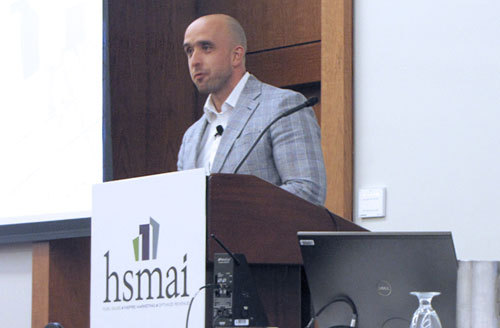✕

Column: industry Tag: hotel industry,Google,booking Published: 2017-07-10 17:45 Source: Author:

Carlos Paulo, of Google, talks about trends in the hotel industry at the HSMAI’s Revenue Optimization Conference. (photo: Sean McCracken)
TORONTO—Google officials have been open and vocal about the company’s growing interest in the travel booking journey and the search engine’s place in it.
So hoteliers, particularly in the revenue-management discipline, gathered around at the HSMAI Revenue Optimization Conference as Carlos Paulo, Google’s head of industry for travel, discussed his company’s perspective on hotels.
Here are some takeaways from that discussion.
The power of micromoments
Google officials have talked at length recently about the idea of “micromoments,” which is a term they use to describe the various points along the booking journey where consumers will set aside a small portion of time to research or dream about potential destinations.
Paulo said this is a natural extension of consumer behaviors.
“If you think about it, we instinctively turn to our devices to get answers on the fly,” he said.
Video is huge in capturing those moments
Paulo said Google, which owns YouTube, has noted that potential travelers are driven greatly by videos while they’re in the “dreaming and planning” stages.
“64% of people who watch travel-related videos do (so) while thinking about a trip,” he said.
Data backs up growing relevance of smartphones
Paulo said mobile is seeing the greatest amount of growth online, with searches up 28%.
He noted a few other key metrics related to smartphones in the booking journey, including that half of the unique travelers to the “top travel sites” are mobile only, and mobile accounts for 40% of online bookings this year. He said beyond that, mobile queries end up touching a far greater number of potential travelers.
“94% of leisure travelers switch between devices, and 46% make decisions on mobile and book on other devices,” Paulo said.
One of the most important aspects in trying to capture the consumer who is browsing via mobile is the speed of a company’s mobile website. He said each second cut out of page loading times amounts to a 27% increase in conversion rates.
Interestingly, Paulo noted that desktop searches are increasing at almost the same rate (+26%).
Tablet booking is down
With all the talk about the boom in mobile bookings, one overlooked caveat seems to be the tablets are being used less and less for hotel bookings. Paulo noted this is not a coincidence.
“It’s interesting but not surprising,” Paulo said. “Phones are getting better and better.”
Hotels need to make better use of guest data
Paulo said hotel companies need to do a better job leveraging one of their biggest advantages over online travel agencies: the amount of information they have about return guests.
“We’re at a point in time where hotels can use that information powerfully to actually speak to their clients,” he said.
He noted that beyond direct interactions with loyal customers, hotel companies can use that information to put together profiles on their most lucrative guests, then use that information to target potential guests who are more willing to stay and spend.
“You can use your own data to inform these decisions,” he said. “You may bid differently for a client with a business travel profile because you identified them as having a higher lifetime value. So, you want to target people with a similar profile to those people you identified in your client base as (having) more value.”
Paulo said these behaviors will grow increasingly important as disruptors continue to encroach on the hotel industry’s space.
“31% of users used Airbnb for business,” he said. “You can look at that as a threat or a challenge, but hotels have information that Airbnb doesn’t.”
No one knows who owns what
In one of the clearest indicators of the fragmented brand landscape for the hotel industry, Paulo said there is a pretty clear trend when it comes to what people are asking when they type in a question related to hotels in the search bar.
“Another interesting thing is with questions related to hotels, six out of 10 posed in Google are about which hotel chains own which brands, which potentially signals a dilution in brands,” he said.
Previous:Canadian Hotel Occupancy Up 4.8 Percent to 74.0 Percent For Week Ending 1 July 2017
Next:STR: US hotel results for week ending 1 July
Hot key words
Hot Products
Popular Vendors